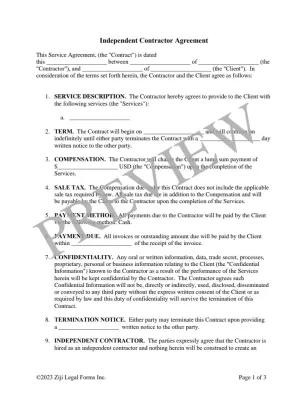Get started with your

Free Independent Contractor Agreement
An independent contractor agreement is used to outline business relationship between a contractor and a client.
This document sets out financial renumeration and services to be rendered with timelines to provide clarity to the parties invovled. This is sometimes known as a service agreement. An independent contractor is not an employee of the client. Those require a contract between employee and employer should seek out an employment agreement.
Click Create Document and let us get you started with your independent contractor agreement. Just answer a few simple questions, revise as many times as you want and download your free PDF within minutes.

SIMPLE
STEPS
STEPS
Answer simple questions
Review and download your document
Print and sign instantly
